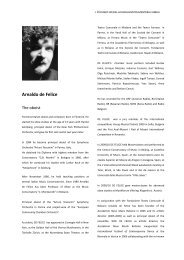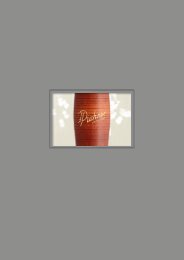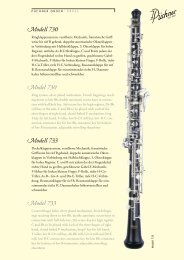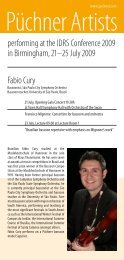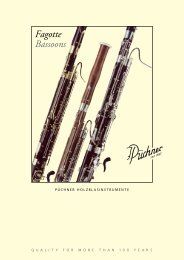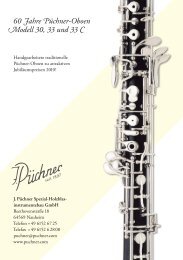Firmenhistorie - Püchner, Nauheim
Firmenhistorie - Püchner, Nauheim
Firmenhistorie - Püchner, Nauheim
Sie wollen auch ein ePaper? Erhöhen Sie die Reichweite Ihrer Titel.
YUMPU macht aus Druck-PDFs automatisch weboptimierte ePaper, die Google liebt.
100 JAHRE PÜCHNER – SPEZIAL- HOLZBLASINSTRUMENTEBAU<br />
seit 1897<br />
100 YEARS PÜCHNER – SPECIAL MANUFACTURE OF WOODWIND INSTRUMENTS
J. PÜCHNER – SPEZIAL-HOLZBLASINSTRUMENTEBAU GMBH<br />
100 Jahre<br />
100 Years<br />
J. PÜCHNER – SPECIAL MANUFACTURE OF WOODWIND INSTRUMENTS LTD.
J. PÜCHNER – SPEZIAL-HOLZBLASINSTRUMENTEBAU GMBH<br />
Vinzenz <strong>Püchner</strong><br />
Walter <strong>Püchner</strong><br />
Josef <strong>Püchner</strong><br />
Gabriele Nilsson-<strong>Püchner</strong>, Gerald <strong>Püchner</strong> und<br />
Ulrike <strong>Püchner</strong><br />
J. PÜCHNER – SPECIAL MANUFACTURE OF WOODWIND INSTRUMENTS LTD.
�<br />
J. PÜCHNER – SPEZIAL-HOLZBLASINSTRUMENTEBAU GMBH 1<br />
m 25. August 1897, als Josef <strong>Püchner</strong> im<br />
böhmischen Graslitz das Licht der Welt<br />
erblickte, meldete sein Vater Vinzenz <strong>Püchner</strong><br />
gleichentags ein selbständiges Gewerbe als<br />
Holzblasinstrumentenmacher an. Vielleicht<br />
war die Geburt eines Sohnes ausschlaggebend<br />
für die Firmengründung, vielleicht waren es<br />
die Zeitverhältnisse: Nach der mehr als<br />
20 Jahre andauernden „Großen Depression“<br />
besserte sich zum Ende des 19. Jahrhunderts<br />
die wirtschaftliche Situation, und der allgemeine<br />
Optimismus hat sicherlich den Sprung<br />
in die Selbständigkeit begünstigt.<br />
Wie sieht die Welt aus in diesem Gründungsjahr<br />
1897? In Frankreich gelingt Clément<br />
Ader der erste Flug über eine Weite von 300<br />
Metern. In St. Louis entsteht aus dem Ragtime<br />
der New Orleans Jazz. In Wien wird u.a.<br />
von Gustav Klimt und Joseph Maria Olbrich<br />
die „Vereinigung bildender Künstler“, die<br />
„Sezession“ gegründet, die das Zentrum des<br />
Wiener Jugendstils bildet. Musikgeschichtlich<br />
ist das Jahr 1897 geprägt durch Festkonzerte<br />
zum 100. Geburtstag von Franz Schubert und<br />
zum 50. Todestag von Felix Mendelssohn-<br />
Bartholdy, ferner durch den Tod von<br />
�<br />
n the very day that his first son was born,<br />
Vinzenz <strong>Püchner</strong> registered in his home<br />
town of Graslitz his independent firm of woodwind-instrument<br />
makers. The young Josef <strong>Püchner</strong><br />
first saw the light of the world on 25th August<br />
1897 in Graslitz, Bohemia, which was at that<br />
time part of the Austro-Hungarian Habsburg Empire.<br />
Perhaps it was the birth of his son which was<br />
the deciding factor in Vinzenz’ decision to register<br />
his own firm, perhaps it was the circumstances of<br />
the time: after twenty years of the Great Depression<br />
economic conditions were improving toward<br />
the end of the nineteenth century, and the general<br />
optimism certainly paved the way for his bid for<br />
independence.<br />
How did the world look in this founding year of<br />
1897? In France Clément Ader achieved the first<br />
flight longer than 300 metres. In St.Louis, New<br />
Orleans Jazz was rising out of ragtime. In Vienna<br />
the secession – the “Vereinigung bildender Künstler“<br />
was formed by Gustav Klimt, Joseph Maria<br />
Olbrich and others, which represented the core of<br />
the Vienna Jugendstil (Art Nouveau). In the realm<br />
of musical history, 1897 was marked by festival<br />
concerts to celebrate the 100th birthday of Franz<br />
Schubert and the 50th anniversary of the death of<br />
Graslitz<br />
100 JAHRE PÜCHNER – SPEZIAL-HOLZBLASINSTRUMENTEBAU
2<br />
J. PÜCHNER – SPEZIAL-HOLZBLASINSTRUMENTEBAU GMBH<br />
Johannes Brahms am 3. April 1897 in Wien. Im<br />
gleichen Jahr kommt Gustav Mahler nach<br />
Wien.<br />
Das Post- und Telegraphenwesen ist zum Ende<br />
des 19. Jahrhunderts schon international ausgebaut,<br />
so daß der Weltpostverein auf seinem<br />
Kongreß in Washington feststellen kann, daß<br />
ihm alle „Kulturstaaten“ der Erde angehören.<br />
Auch das Verkehrswesen ist gut entwickelt: Das<br />
deutsche und österreichische Eisenbahnnetz<br />
umfaßt 40 000 Kilometer und verbindet Wien<br />
über Prag mit Berlin. In einem zeitgenössischen<br />
Zitat heißt es:<br />
„Von allen größeren Strecken wird der gelbe Postwagen<br />
verdrängt, die Poesie des Posthorns schwindet aus den<br />
Thälern, von den Höhen, das Dampfroß verscheucht sie,<br />
und das neueste Verkehrsmittel, das Fahrrad, hilft ihm<br />
dabei getreulich mit.“ [1]<br />
Auch Graslitz ist an das Netz angeschlossen.<br />
Vinzenz <strong>Püchner</strong>s Heimatort Graslitz hatte das<br />
Stadtrecht bereits 1370 durch Kaiser Karl IV<br />
erhalten, der besonders den Bergbau in der<br />
Gegend förderte („freie Bergstadt“ Graslitz). Es<br />
wurden Kupfer, daneben auch Zinn, Blei und<br />
Silber gewonnen. Im 17. Jahrhundert gingen<br />
die Erträge allerdings zurück, und die Bergleute<br />
mußten sich nach anderen Erwerbsmöglichkeiten<br />
umschauen. Schon 1669 soll in<br />
Graslitz eine Geigenbauinnung gegründet<br />
worden sein; Holzblasinstrumentenbau ist seit<br />
1753 und Blechblasinstrumentenbau seit 1778<br />
in Graslitz überliefert.<br />
Von 1810 an wurden in Graslitz einige bedeutende<br />
Instrumentenbaufirmen gegründet:<br />
1810 Firma Daniel Langhammers Söhne<br />
1824 Firma Wenzel Stowassers Söhne<br />
1840 Firma Vinzenz Kohlerts Söhne<br />
1850 Firma Bohland & Fuchs<br />
1855 Firma Adolf & Julius Lehrer<br />
1870 Firma Johann Michel und Sohn<br />
Es gab etliche Holzblasinstrumentenmacher, die<br />
in Graslitz und im benachbarten Markneukirchen<br />
um Kunden konkurrierten. Demgemäß<br />
wurde Graslitz zum Ende des 19. Jahrhunderts<br />
Felix Mendelssohn-Bartholdy. It was marked further<br />
by the death on 3rd April of Johannes<br />
Brahms, and in the same year Vienna’s doors welcomed<br />
Gustav Mahler.<br />
The Post and Telegraph network had at the end<br />
of the 19th century already achieved international<br />
status, such that the World Postal Union<br />
was able to assert at its Congress held in Washington<br />
DC on 15th June 1897, that all “cultured<br />
states“ of the world belonged to it. Transport infrastructure<br />
was also well developed – the German<br />
and Austrian railway network embraced<br />
40 000 km and linked Vienna, Prague and Berlin.<br />
A contemporary report however bemoaned:<br />
“From all the great highways the yellow postal carriage will<br />
be expelled: the poetry of the post-horn dwindles from the<br />
valleys and heights; the iron horse extinguishes it, faithfully<br />
assisted by that newest means of transport, the bicycle.“<br />
Graslitz was also connected to the system.<br />
Vinzenz <strong>Püchner</strong>’s home town of Graslitz was<br />
granted city rights as early as 1370 by the Emperor<br />
Charles IV, which especially promoted<br />
mining in the district (“free mining town<br />
Graslitz”). In this region of the Erzgebirge (Ore<br />
Mountains), copper, tin lead and silver were extracted.<br />
In the 17th century profits from mining<br />
declined markedly and the mining population<br />
had to search around for new livelihoods. A violin<br />
builders guild was founded in Graslitz in<br />
1669, the making of woodwind instruments is<br />
recorded from 1753 and of brass instruments<br />
from 1778.<br />
From 1810 onward Graslitz saw the founding of<br />
several notable instrument building firms:<br />
1871 Firma J. B. Geßner<br />
1875 Firma A. R. Breinl<br />
1877 Firma A. K. Hüttl<br />
1882 Firma F. X. Hüller & Co.<br />
1895 Firma Johann Köstler<br />
1897 Firma Vinzenz <strong>Püchner</strong> [2]<br />
There were several woodwind instrument firms<br />
in Graslitz and neighbouring Markneukirchen,<br />
just over the frontier in Germany, which competed<br />
for trade. Accordingly, toward the end of<br />
100 YEARS PÜCHNER – SPECIAL MANUFACTURE OF WOODWIND INSTRUMENTS
J. PÜCHNER – SPEZIAL-HOLZBLASINSTRUMENTEBAU GMBH 3<br />
(außer als „Metropole der böhmischen Spitzenklöppelei“)<br />
als Hauptsitz der österreichischen<br />
Instrumentenfabrikation bezeichnet.<br />
Überhaupt hatte die Stadt im letzten Drittel des<br />
19. Jahrhunderts einen beträchtlichen Aufschwung<br />
genommen: 1877 wurde Gasbeleuchtung<br />
eingeführt, 1893 das Wasserleitungssystem<br />
fertiggestellt und 1897 die Kanalisierung<br />
der Stadt abgeschlossen. 1904 ging sogar ein<br />
Elektrizitätswerk in Betrieb. Ein städtisches<br />
Telephonamt wurde 1900 dem seit etwa 1860<br />
bestehenden Telegraphenamt hinzugefügt. 1891<br />
gründete man eine städtische Sparkasse, 1903<br />
eine „Kreditkasse der Musikinstrumenten-<br />
Erzeuger“, um den Instrumentenbaufirmen<br />
Investitionen zu ermöglichen. Überdies war<br />
schon 1865 eine Fachschule für Musikinstrumenten-Erzeugung<br />
eingerichtet worden. Im<br />
„Adreß- und Auskunftsbuch der Stadt Graslitz<br />
in Böhmen“ wird die Situation des Graslitzer<br />
Instrumentenbaues in den Gründungsjahren<br />
der <strong>Püchner</strong>-Firma wie folgt beschrieben:<br />
„Die Graslitzer Musikinstrumenten-Industrie ist eine Volksindustrie<br />
im wahren Sinne des Wortes, denn unzählige<br />
Hände in Stadt und Land finden in ihr Beschäftigung und<br />
Lebenserwerb. Überall hört man das emsige Pochen und<br />
Hämmern, Drehbänke und Maschinen lassen ihr surrendes<br />
Lied ertönen, überall arbeiten Fleiß und Umsicht an<br />
den Werkzeugen der Musik, dem gewaltigen Reiche der<br />
Töne und der Harmonie neue Hilfstruppen zuführend.<br />
Die Musikinstrumenten-Industrie von Graslitz hat in den<br />
letzten Jahrzehnten einen gewaltigen Aufschwung genommen,<br />
aus der Kleinindustrie stiegen große und moderne<br />
Fabriken empor, die zu den ersten ihrer Art gehören.<br />
Kleingewerbe und Großindustrie arbeiten Hand in Hand,<br />
die Graslitzer Musikinstrumenten-Industrie hat Weltruf<br />
erlangt, ihre Erzeugnisse sind in allen Ländern der Welt<br />
anzutreffen und erfreuen sich eines hervorragenden Rufes.<br />
Aber nicht nur die Industrie, sondern auch die Musik findet<br />
in Graslitz ein trautes Heim, wo sie mit Liebe und reifem<br />
Verständnis gepflegt wird. Groß und klein betätigt<br />
sich in den unerschöpflichen Idealen der Musik. An der<br />
Spitze der Musikpflege steht die k.k. Fachschule für Musikinstrumenten-Erzeugung,<br />
wo in allen Fächern und Instrumenten<br />
vortrefflicher Unterricht gegeben wird. Aber nicht<br />
the 19th century Graslitz was designated as the<br />
chief centre of Austrian instrument manufacturing<br />
(in addition to being known as the “Metropolis<br />
of Bohemian Bobbin-lace Making“’).<br />
In general the town had enjoyed a considerable<br />
prosperity in the last third of the 19th century:<br />
1877 had seen the introduction of gas street<br />
lighting, in 1893 the running water system and<br />
in 1897 the city’s sewage system was completed.<br />
Even an electricity supply went into service in<br />
1904. In 1900 a city telephone office was added<br />
to the telegraph office, which had existed since<br />
1860. In 1891 the city’s Investment Bank was<br />
founded, and in 1901 a Musical Instrument<br />
Producer’s Credit Bank, to facilitate investment<br />
in the instrument producing firms. In addition<br />
to this a technical school for musical instrument<br />
building had been established in 1865. In the<br />
founding year edition of the “Address and<br />
Information Guidebook of the Bohemian City<br />
of Graslitz” the condition of Graslitz’ musical instrument<br />
production was described as follows:<br />
“The Graslitz’ musical instrument industry is a people’s<br />
industry in the fullest sense of the word, for innumerable<br />
hands in town and country find in it their occupation<br />
and livelihood. Everywhere one hears the diligent beating<br />
and hammering; lathes and machines give out their humming<br />
song, everywhere diligence and prudence work on<br />
the instruments of music, expanding the powerful empire<br />
of sound and harmony. The musical instrument industry<br />
of Graslitz has become powerfully more prosperous<br />
in the last decade; out of cottage industries have grown<br />
large and modern factories, representing the state of their<br />
art. Small business and big industry work hand in hand.<br />
Graslitz’ musical instrument industry has gained a worldwide<br />
renown, its products are found in all countries of the<br />
world and enjoy for themselves an exceptional demand.<br />
And not just industry but music itself finds in Graslitz a<br />
cosy home, where it is nurtured with love and mature<br />
understanding. Great and small practise themselves in the<br />
inexhaustible ideals of music. At the forefront of caring<br />
for music stands the Royal and Imperial Technical School<br />
for musical instrument production, where excellent<br />
instruction is given in all crafts and on all instruments.<br />
Yet it is not just theoretical schooling which is offered in<br />
100 JAHRE PÜCHNER – SPEZIAL-HOLZBLASINSTRUMENTEBAU
4<br />
J. PÜCHNER – SPEZIAL-HOLZBLASINSTRUMENTEBAU GMBH<br />
nur theoretische Schulung wird in dieser bedeutenden<br />
Anstalt erteilt, sondern auch der praktische Bau von<br />
Musikinstrumenten wird hier unter besonderer Bedachtnahme<br />
des theoretisch vertieften Verständnisses in Muster-<br />
Lehrwerkstätten vorgeführt.<br />
Graslitz besitzt vortreffliche Musikkapellen, deren sich<br />
selbst große Städte nicht rühmen dürfen. Graslitz besitzt<br />
weit und breit den Ruf einer erstklassigen Musikstadt im<br />
wahren Sinne des Wortes. Zur Förderung der gewerblichen<br />
Interessen besteht eine Genossenschaft der Instrumentenmacher,<br />
die 350 selbständige gewerbliche Betriebe<br />
umfaßt, ferner eine Kreditkasse der Musikinstrumenten-<br />
Erzeuger, die die materielle Unterstützung ihrer Mitglieder<br />
bezweckt.“ [3]<br />
Allerdings darf nicht vergessen werden, daß bei<br />
allem wirtschaftlichen und kulturellen Aufschwung<br />
die Lebensumstände der Bevölkerung<br />
überwiegend ärmlich gewesen sind. Vor allem<br />
die kleineren Betriebe, die den großen Unternehmen<br />
zulieferten und von diesen abhängig<br />
waren, hielten sich oft mühsam am Rande des<br />
Existenzminimums. Der in Graslitz aufgewachsene<br />
Wiener Regierungsrat Julius Martin erinnert<br />
sich:<br />
„Wenn wir die Geschichte unserer Stadt verfolgen –... –<br />
müssen wir uns aber auch mit der sozialen Seite befassen<br />
und uns dann eingestehen, daß die Lebensverhältnisse und<br />
der Lebensstandard der Bevölkerung, von wenigen Unternehmerfamilien<br />
abgesehen, zuweilen triste und niedrig<br />
waren. Demgemäß konnte sich auch das bauliche Bild der<br />
romantisch gelegenen Stadt nur allmählich neuzeitlich<br />
gestalten. ...Wir können nicht behaupten, daß es dem<br />
Arbeiter möglich war, bis 1918 zu einem bescheidenen<br />
Wohlstand zu kommen. Seine Verdienste reichten nur zu<br />
einem ganz bescheidenen Leben. Aber auch der Reingewinn<br />
der Unternehmer mag, um der Konkurrenz standhalten<br />
zu können, durchaus mäßig gewesen sein, der der<br />
‚kleinen Meister‘ geradezu bescheiden.“ [4]<br />
Auch die Blechblasmaschinenwerkstatt von<br />
Johann Baptist Geßner, bei dem Vinzenz <strong>Püchner</strong><br />
aufwuchs, gehörte zu den kleinen Zulieferbetrieben.<br />
Vinzenz <strong>Püchner</strong>, geboren am 8. Juli<br />
1870 in Graslitz, hatte seine Eltern früh verloren<br />
und lebte bei Familie Geßner, wo er von<br />
klein auf mit dem Blasinstrumentenbau in<br />
this important establishment, but also the practical construction<br />
of musical instruments is carried forward in<br />
model teaching workshops with especial attention to fundamental<br />
principles.<br />
Graslitz possesses excellent musical ensembles of a quality<br />
which larger cities are unable to boast. Graslitz has far and<br />
wide the name of a first class musical town in the fullest<br />
meaning of the word. An Instrument Makers Association<br />
exists for the furtherance of trade interests, which embraces<br />
350 independent firms of the trade; further there is a<br />
Credit Bank of Musical Instrument Producers, with the<br />
general purpose of providing material support to its members.“<br />
It should not be generally forgotten that alongside<br />
the business and cultural prosperity, the<br />
living conditions of the general population were<br />
predominantly poor. Above all, the small businesses<br />
which serviced and supplied the larger<br />
enterprises and which were dependent upon<br />
them, often sustained themselves only at the<br />
margin of a minimal existence. The Vienna<br />
government councillor Julius Martin, who grew<br />
up in Graslitz, recalled:<br />
“If we follow the history of our city....we must also take in<br />
the social side, and answer for the fact that the living conditions<br />
and standard of living of the population, apart from<br />
the few big business families, were at times sad and<br />
humble. Accordingly the structural condition of the<br />
romantically situated city could only gradually be modernised....<br />
we cannot assert that it was possible for the working<br />
man to achieve even a modest prosperity, prior to<br />
1918. His earnings provided only for a meagre living. Yet<br />
even the net profits of the entrepreneurs had to be continually<br />
moderated, in order to stand firm against the competition;<br />
that of the ‘little masters’ was modest indeed.”<br />
The brass instrument valve workshop of Johann<br />
Baptist Geßner, where Vinzenz <strong>Püchner</strong> grew<br />
up, belonged to the ranks of the small service<br />
suppliers. Vinzenz <strong>Püchner</strong>, born on 8th July<br />
1870 in Graslitz, had lost his parents while very<br />
young and had gone to live with the Geßner<br />
family, where he had come into early contact<br />
with the making of wind instruments. He<br />
learned to play the oboe, clarinet and bassoon,<br />
became later a much sought-after musician and<br />
100 YEARS PÜCHNER – SPECIAL MANUFACTURE OF WOODWIND INSTRUMENTS
J. PÜCHNER – SPEZIAL-HOLZBLASINSTRUMENTEBAU GMBH 5<br />
Anzeige der Firma<br />
<strong>Püchner</strong> von 1904<br />
Advert of <strong>Püchner</strong><br />
from 1904<br />
Berührung kam. Er lernte Oboe, Klarinette und<br />
Fagott spielen, wurde später ein gesuchter<br />
Musiker und leitete einen Kadettenchor. Den<br />
Holzblasinstrumentenbau erlernte er bei „Vinzenz<br />
Kohlert’s Söhne“ in Graslitz, einer 1840<br />
gegründeten Firma, die alle Holzblasinstrumente<br />
vom Piccolo bis zum Kontrafagott herstellte.<br />
Nach seinen Wanderjahren, die ihn u.a.<br />
zu Pfaff nach Kaiserslautern führten, kehrte<br />
Vinzenz <strong>Püchner</strong> in die erzgebirgische Heimat<br />
zurück und machte sich schließlich selbständig.<br />
Von Anfang an legte er Wert auf besondere<br />
Sorgfalt beim Bau seiner Oboen, Klarinetten,<br />
Fagotte und Flöten. Bei der Entwicklung und<br />
Ausführung bis hin zur Ausstimmung kamen<br />
ihm seine Erfahrungen als Musiker zugute, die<br />
ihn auch zu einem kompetenten Gesprächspartner<br />
für seine Kunden machten. Er beteiligte<br />
sich früh an regionalen Ausstellungen (Aussig<br />
1903 und Komotau 1913), erhielt goldene<br />
Medaillen und verschaffte so der noch jungen<br />
Firma ein beachtliches Renommee. Auch persönlich<br />
genoß Vinzenz <strong>Püchner</strong> großes Anse-<br />
directed a Cadets’ Choir. He learned the building<br />
of woodwind instruments at the firm of<br />
Vinzenz Kohlerts Sons in Graslitz, a firm<br />
founded in 1840 which made all woodwind instruments<br />
from piccolo to contra-bassoon. After<br />
some years of travelling, which led him among<br />
others to the Pfaff Co. – a musical instrument<br />
maker of the time in Kaiserslautern – Vinzenz<br />
returned to his Erzgebirge home and established<br />
his independence. From the very beginning he<br />
placed high value on the taking of painstaking<br />
care in the building of his oboes, clarinets, bassoons<br />
and flutes. In the carrying out of development<br />
and manufacture, through the tuning of<br />
his instruments, his experiences as a musician<br />
stood him in good stead, and also made him able<br />
to discourse competently with his customers.<br />
Early on he took part in regional exhibitions<br />
(Aussig 1903 and Komotau 1913), gained gold<br />
medals and fashioned a notable reputation for<br />
the still young firm. Vinzenz <strong>Püchner</strong> also enjoyed<br />
great personal respect within his city community.<br />
He occupied several honorary posi-<br />
100 JAHRE PÜCHNER – SPEZIAL-HOLZBLASINSTRUMENTEBAU
6<br />
J. PÜCHNER – SPEZIAL-HOLZBLASINSTRUMENTEBAU GMBH<br />
hen innerhalb seiner Stadtgemeinde. Er bekleidete<br />
mehrere Ehrenämter, z.B. als<br />
Aufsichtsratsmitglied der Kreditkasse, als<br />
Innungs-Obmann, als Mitglied des Gemeindeausschusses<br />
und als Mitglied der Armenabteilung<br />
des Bürgermeisteramtes, die sich um<br />
soziale Belange kümmerte. Vinzenz <strong>Püchner</strong><br />
war Eigentümer des Anwesens 543, „Am Graben“,<br />
wo er mit seiner Frau Antonia lebte, die<br />
außer dem erstgeborenen Josef noch fünf weitere<br />
Kinder zur Welt brachte: Lotte, Karl,<br />
Robert, Wilhelm und Hermine. – Josef ergriff<br />
den Beruf des Vaters, absolvierte seine Lehre in<br />
der väterlichen Werkstatt und besuchte danach<br />
– wie später seine jüngeren Brüder Karl und<br />
Wilhelm – für zwei Jahre die Fachschule für<br />
Instrumentenbau, die er mit der Meisterprüfung<br />
abschloß. Erst siebzehnjährig mußte Josef<br />
1914 bei Beginn des ersten Weltkrieges die Firmenleitung<br />
übernehmen, weil sein Vater Vinzenz<br />
zum Militär eingezogen wurde. Aber auch<br />
Josef und Karl mußten dann von 1915 bis 1918<br />
zum Militärdienst.<br />
Vinzenz <strong>Püchner</strong> und seine Familie ca. 1910,<br />
außen rechts Josef <strong>Püchner</strong><br />
tions, for example as a member of the governing<br />
council of the Credit Bank, as Chairman of the<br />
Guild, as a member of the Municipal Committee<br />
and as a member of the poverty department<br />
of the Mayor’s Office, which concerned itself<br />
with social issues. Vinzenz <strong>Püchner</strong> was the<br />
owner of a property on “Am Graben” street, No.<br />
543 where he lived with his wife Antonia, who<br />
brought forth Josef, their first child and five further<br />
children: Lotte, Karl, Robert, Wilhelm and<br />
Hermine. Josef in time took up his father’s trade,<br />
completed his studies in his father’s workshop<br />
and thereafter attended the technical school – as<br />
later did his younger brothers Karl and Wilhelm<br />
– for two years, graduating with a master certificate.<br />
In 1914 at the age of 17, Josef had to take<br />
over the leadership of the firm due to the outbreak<br />
of World War I and the calling up of his<br />
father Vinzenz into the Austrian military. Later<br />
Josef and even Karl were conscripted for military<br />
service between 1915 and 1918.<br />
Vinzenz <strong>Püchner</strong> and his family (around 1910)<br />
with Josef <strong>Püchner</strong> on the right<br />
100 YEARS PÜCHNER – SPECIAL MANUFACTURE OF WOODWIND INSTRUMENTS
J. PÜCHNER – SPEZIAL-HOLZBLASINSTRUMENTEBAU GMBH 7<br />
Nach dem verlorenen ersten Weltkrieg zerfiel<br />
der Vielvölkerstaat Österreich-Ungarn, zu dem<br />
auch Böhmen gehörte, in eine Anzahl von<br />
Nationalstaaten. Der böhmische Teil des<br />
„Musikwinkels“, repräsentiert durch seine<br />
Hauptorte Graslitz und Schönbach, gehörte<br />
nun zur neu gegründeten Tschecho-Slowakischen<br />
Republik. Der Saiteninstrumentenfabrikant<br />
Josef Höfner aus Schönbach erinnert sich:<br />
„Nach Schluß des Krieges stand Schönbach einer vollkommen<br />
veränderten Situation gegenüber. Österreich-Ungarn,<br />
von dem Bismarck einmal sagte: ‚Wenn Österreich-Ungarn<br />
nicht bestünde, müßte man es schaffen‘, lag zertrümmert<br />
am Boden. Die Nachfolgestaaten, von nationalem Chauvinismus<br />
geblendet, schirmten sich sofort gegenseitig durch<br />
hohe Zollmauern ab, die Tschechei, zu welcher unsere alte<br />
Heimat nun gehörte, konnte natürlich den alten Inlandsabsatz<br />
nur zum Teil ersetzen, der Weg nach dem Südosten<br />
bestand nicht mehr, Rußland schied als Abnehmer total<br />
aus, nur der Absatz nach Deutschland (Markneukirchen)<br />
lief ungestört weiter. Zwangsläufig mußte man sich nach<br />
neuen Absatzgebieten umsehen.“ [5]<br />
Werkstatt und Wohnhaus „Am Graben“<br />
in Graslitz ca. 1910<br />
Workshop and residential building<br />
“Am Graben”, Graslitz around 1910<br />
After the loss of the Great War the multi-national<br />
state of Austria-Hungary, of which Bohemia<br />
was a part, broke up into a number of national<br />
states. The Bohemian part of the “musicbelt”,<br />
represented by the chief cities of Graslitz<br />
and Schönbach, belonged to the newly-founded<br />
Czechoslovak Republic. The string instrument<br />
maker Josef Höfner of Schönbach recalled:<br />
“Following the end of the war, Schönbach faced completely<br />
changed circumstances. Austria-Hungary, of which Bismarck<br />
once said ‘If Austria-Hungary didn’t exist, someone<br />
would have to create it’ lay in ruins. The successor states,<br />
dazzled by national chauvinism, protected themselves with<br />
high reciprocal customs barriers. The Czech lands to which<br />
our homeland now belonged could only partially replace<br />
the old inland market. The way to the south-east was now<br />
barred, Russia had withdrawn completely from trade. Only<br />
the outlet to Germany (Markneukirchen) continued uninterrupted.<br />
To seek out new markets was compulsory.”<br />
100 JAHRE PÜCHNER – SPEZIAL-HOLZBLASINSTRUMENTEBAU
8<br />
J. PÜCHNER – SPEZIAL-HOLZBLASINSTRUMENTEBAU GMBH<br />
Ähnliche Schwierigkeiten hatten die Blasinstrumentenfabrikanten<br />
in Graslitz. Während dieser<br />
Jahre übertrug die Firma <strong>Püchner</strong> die Exklusivrechte<br />
für den Verkauf ihrer Instrumente in<br />
Deutschland der Klingenthaler Firma „Meinel<br />
& Herold“. Die Verkäufe erfolgten unter deren<br />
Namen.<br />
Werkstatt und Wohnhaus „Am Graben“<br />
in Graslitz ca. 1920<br />
Workshop and residential building<br />
“Am Graben”, Graslitz around 1920<br />
Titelseite des Firmenkataloges (veröffentlicht<br />
ca. 1920, verwandt bis ca. 1930)<br />
Front page of the company’s catalogue<br />
published around 1920 used till 1930<br />
The woodwind instrument makers of Graslitz<br />
had similar difficulties. During these years the<br />
<strong>Püchner</strong> firm transferred exclusive rights for the<br />
sales of their instruments in Germany to the<br />
Klingenthal firm of Meinel & Herold, who sold<br />
them in their own name.<br />
100 YEARS PÜCHNER – SPECIAL MANUFACTURE OF WOODWIND INSTRUMENTS
J. PÜCHNER – SPEZIAL-HOLZBLASINSTRUMENTEBAU GMBH 9<br />
Für die Kunden in aller Herren Länder druckte<br />
die Firma <strong>Püchner</strong> mehrsprachige Kataloge. Der<br />
umfangreiche Katalog, den die Firma nach<br />
1920 herausgab, listete 144 Modelle auf, die in<br />
verschiedenen Stimmungen und Ausstattungsvarianten<br />
bestellt werden konnten. Die Anzahl<br />
der Modellinstrumente, die von der Firma selbst<br />
entwickelt worden waren, lag bei über 500 Baumustern.<br />
In den Sprachen deutsch, englisch,<br />
spanisch und portugiesisch abgefaßt, war das<br />
Angebot wie folgt:<br />
Pikkolos in C, Des und Es<br />
Pikkolos in C, Des und Es, französisches System<br />
Pikkolos, System Böhm<br />
Metall-Pikkolos, System Böhm<br />
Flöten in C<br />
Flöten feinerer Qualität, französisches System<br />
Flöten, System Schwedler-Kruspe<br />
Ringklappen-Flöten, System Böhm<br />
Flöten, System Böhm, Zylinder-Bohrung<br />
Metall-Flöten, System Böhm, aus Neusilber<br />
Klarinetten in Es, D, C, B, A oder G<br />
Feinste Konzert-Klarinetten, sehr zu empfehlen<br />
für Musiker und Militärkapellen<br />
Klarinetten, französisches System<br />
Klarinetten, englisches System<br />
Klarinetten, System Böhm<br />
Metall-Klarinetten, System Böhm, in B<br />
Alt-Klarinetten oder Bassethörner<br />
in F, deutsches System<br />
Alt-Klarinetten in Es, französisches System<br />
und System Böhm<br />
Baß-Klarinetten in B; deutsches, französisches<br />
System und System Böhm<br />
Oboen, deutsches und französisches System<br />
Englisch Hörner, deutsch-französisches System<br />
Fagotte, deutsches System<br />
Fagotte, französisches System<br />
Kontra-Fagotte, deutsches System [6]<br />
Um der steigenden Nachfrage gerecht zu werden,<br />
mußte die Werkstatt immer wieder erweitert<br />
werden. 1938 wurde zunächst ein separates<br />
Haus für die Fagottwerkstatt und das Lager<br />
gepachtet, dann „Am Graben“ ein weiteres<br />
Haus gekauft. Die Mitarbeiterzahl betrug in<br />
dieser Zeit etwa 50. Während die großen<br />
For their customers in the major countries,<br />
<strong>Püchner</strong> produced a multi-lingual catalogue.<br />
The comprehensive catalogue issued by the firm<br />
in the 1920’s, listed 144 models which could be<br />
built in different pitches and with variable specifications.<br />
The number of instrument models,<br />
which had been developed by the firm itself,<br />
totalled over 500 designs.<br />
The following product range was offered in<br />
German, English, Spanish and Portuguese:<br />
Piccolos in C, D flat and E flat<br />
Piccolos in C. D flat and E flat, French system<br />
Piccolos, Böhm system<br />
Metal-piccolo, Böhm system<br />
Flutes in C<br />
Flutes, refined-quality, French system<br />
Flutes, Schwedler-Kruspe system<br />
Flutes, ring keys, Böhm system<br />
Flutes, Böhm system, cylindrical bore<br />
Metal Flutes, Böhm system, nickel-silver<br />
Clarinets in E flat, D, C, B flat, A or G<br />
Finest concert-clarinets. highly recommended<br />
for musicians and military bands<br />
Clarinets, French system<br />
Clarinets, English system<br />
Clarinets, Boehm system<br />
Metal-clarinets, Böhm system, in B flat<br />
Alto-clarinets or basset-horns<br />
in F, German system<br />
Alto-clarinets in E flat, French system and<br />
Böhm system<br />
Bass-clarinets in B flat, German, French<br />
and Böhm systems<br />
Oboes, German and French systems<br />
English horns, German-French system<br />
Bassoons, German system<br />
Bassoons, French system<br />
Contra-bassoon, German system<br />
To cope with the steadily increasing demand, the<br />
workshop had to be continually enlarged. In<br />
1938 first of all a separate building was leased for<br />
the bassoon workshop and store, and then another<br />
house on “Am Graben” street was bought.<br />
The number of workers carried by the firm at<br />
this time was about 50. While the large factory-<br />
100 JAHRE PÜCHNER – SPEZIAL-HOLZBLASINSTRUMENTEBAU
10<br />
J. PÜCHNER – SPEZIAL-HOLZBLASINSTRUMENTEBAU GMBH<br />
Vinzenz <strong>Püchner</strong> mit Lehrling,<br />
Graslitz ca. 1938<br />
Vinzenz <strong>Püchner</strong> with apprentice,<br />
Graslitz, around 1938<br />
Fabrikbetriebe bis zu 300 Mitarbeiter beschäftigten,<br />
blieb <strong>Püchner</strong> ein eher auf individuelle<br />
Einzelfertigung spezialisierter Handwerksbetrieb,<br />
der sich auf zeitgeschichtlich bedingte Veränderungen<br />
und Einschränkungen leichter einstellen<br />
konnte als die Graslitzer Großbetriebe.<br />
Im Folgeprospekt wirbt <strong>Püchner</strong> wie folgt:<br />
„Seit mehr als 40 Jahren bin ich Spezialist auf dem Gebiete<br />
des Holzblasinstrumentenbaues. Mit ganz modernen Spezial-Präzisions-Maschinen<br />
und mit reichen Erfahrungen<br />
aus der Praxis ist es mir möglich, ganz erstklassige Instrumente<br />
herzustellen. Die beste Gewähr für einwandfreie<br />
reine Stimmung und die Vollkommenheit meiner Instrumente<br />
bieten auch meine guten musikalischen Kenntnisse,<br />
welche es mir bereits in früheren Jahren ermöglichten,<br />
in Theater- und Militärkapellen auf verschiedenen<br />
Instrumenten die erste Stimme zu spielen. Ebenso haben<br />
sich meine 3 Söhne im Laufe der Jahre sowohl auf fachlichem<br />
als auch auf musikalischem Gebiete derart vervollkommnet,<br />
daß sie mich in allen Belangen tatkräftig unterstützen.<br />
Sie werden also unbedingt fachmännisch bedient.“<br />
[7]<br />
style businesses employed up to 300 workers,<br />
<strong>Püchner</strong> adhered to their methods of specialised<br />
production by hand-craftsmanship, which were<br />
able to absorb developments and restrictions<br />
from time to time more easily than the large<br />
Graslitz firms. In the following passage <strong>Püchner</strong><br />
advertised:<br />
“For more than 40 years I have been a specialist in the<br />
building of woodwind instruments. The most modern<br />
high-precision machine tools and my vast practical<br />
experience enable me to produce first class instruments.<br />
The best guarantee of flawless pitch and of the perfection<br />
of my instruments is offered by my good musical knowhow,<br />
which I gained in my earlier years by playing leading<br />
parts on several different instruments, in theatre and<br />
military bands. Similarly my three sons have in the course<br />
of time perfected their skills in both technical and musical<br />
matters, in such a way that they actively support my work<br />
in all important respects. Thus you will be served by an<br />
unrivalled technical expertise.“<br />
100 YEARS PÜCHNER – SPECIAL MANUFACTURE OF WOODWIND INSTRUMENTS
J. PÜCHNER – SPEZIAL-HOLZBLASINSTRUMENTEBAU GMBH 11<br />
Politisch war die Zeit nach dem Ende des ersten<br />
Weltkrieges voller Spannungen zwischen den<br />
verschiedenen Volksgruppen der Tschechoslowakei.<br />
„Die deutschsprachige Minderheit besaß<br />
kein politisches Mitspracherecht, und es<br />
herrschten unparitätische Regierungsverhältnisse.<br />
Offizielle Positionen in Ämtern, Bahn,<br />
Post, Polizei etc. waren von tschechischen Beamten<br />
besetzt“, erinnert sich Walter <strong>Püchner</strong> an die<br />
Familienüberlieferung. Gemäß dem Münchner<br />
Abkommen vom September 1938 wurden die<br />
überwiegend deutsch besiedelten Gebiete der<br />
CSR dem Deutschen Reich angegliedert. Die<br />
tschechoslowakische Seite hatte dies hinzunehmen,<br />
da auch Briten und Franzosen den<br />
Anschluß befürworteten, ohne daß dadurch<br />
Hitlers Territorialansprüche befriedigt gewesen<br />
und seine Kriegsvorbereitungen verzögert worden<br />
wären.<br />
Schon bald nach der Eingliederung in das Deutsche<br />
Reich wurden viele Mitarbeiter der Firma<br />
<strong>Püchner</strong> zum Militär einberufen. Wilhelm<br />
<strong>Püchner</strong> war bereits 1937 zum tschechischen<br />
Militärdienst eingezogen worden und mußte<br />
dann in der deutschen Wehrmacht bis Kriegsende<br />
dienen. Seit 1937 waren die drei Brüder<br />
Josef, Karl und Wilhelm Mitinhaber der Firma.<br />
Der kaufmännische Leiter Karl <strong>Püchner</strong> starb<br />
1943 und wurde in dieser schweren Zeit empfindlich<br />
vermißt. Die Führung des Familienunternehmens<br />
oblag nun Josef <strong>Püchner</strong>. 1924 hatte<br />
er Paula Ubl geheiratet, und beider Kinder Gerta<br />
und Walter <strong>Püchner</strong> halfen schon in der Firma.<br />
Walter begann 1944 seine Lehre als Holzblasinstrumentenmacher.<br />
Auch während des Krieges<br />
stellte man weiterhin Instrumente her, die<br />
hauptsächlich für den Export bestimmt waren,<br />
teilweise wurde die Produktion aber auch auf<br />
Rüstungsaufträge für den Flugzeugbau umgestellt.<br />
Dr. Adolf Fuchs schildert die Zeit während<br />
des zweiten Weltkrieges in seiner 1953<br />
erschienenen Doktorarbeit:<br />
„Während der Zeit des zweiten Weltkrieges konnte die<br />
Kleinmusikindustrie lange ihr Produktionsprogramm –<br />
wenn auch in beschränktem Maße – aufrecht erhalten. Propagandistisch-kulturelle<br />
Gründe (Wehrmachtsbetreuung)<br />
The period between the wars was one of great<br />
political tension between the various peoples of<br />
the new Czechoslovak Republic. “The German<br />
speaking minority possessed no right of political<br />
representation, and discriminatory legislation<br />
was passed. Official positions in government<br />
offices, railways, post office, police etc.<br />
were occupied only by Czech officials” Walter<br />
<strong>Püchner</strong> has commented in the family archives.<br />
As a result of the Munich agreement of September<br />
1938 the areas of the Czech Republic occupied<br />
by a majority of ethnic Germans were<br />
annexed by the Third Reich. The Czechoslovaks<br />
had no choice but to tolerate this, since<br />
Britain and France had supported the annexation,<br />
despite the fact that even by doing so they<br />
failed to satisfy Hitler’s territorial ambitions or<br />
to delay his preparations for war.<br />
Shortly after the annexation to the German<br />
Reich, many employees of the <strong>Püchner</strong> Firm<br />
were called up by the German military. Wilhelm<br />
<strong>Püchner</strong> had previously been conscripted<br />
in 1937 by the Czech military, and now had to<br />
serve in the German Wehrmacht until the end<br />
of the war. Since 1937 the three brothers Josef,<br />
Karl and Wilhelm had been partners in the<br />
firm. Sales director Karl <strong>Püchner</strong> died in 1943<br />
and was severely missed in these difficult times.<br />
The leadership of the family enterprise now fell<br />
to Josef <strong>Püchner</strong>. In 1924 he had married Paula<br />
Ubl, and both their children Gerta and Walter<br />
were already helping in the business. Walter<br />
commenced his studies as a woodwind instrument<br />
maker in 1944. Even during the war<br />
instrument production continued although<br />
mainly for export, and the firm was partly<br />
turned over to war production, to the manufacturing<br />
of aircraft parts. Dr. Adolf Fuchs<br />
portrayed this wartime period in his doctoral<br />
thesis, published in 1953:<br />
“For much of the period of World War II the small musical<br />
industry was able to sustain its production programme,<br />
albeit in an attenuated mode. Cultural-propaganda reasons<br />
(supplying the military) and exports to neutral states<br />
made this possible. Only in the last years was conversion to<br />
armament production unavoidable.<br />
100 JAHRE PÜCHNER – SPEZIAL-HOLZBLASINSTRUMENTEBAU
12<br />
J. PÜCHNER – SPEZIAL-HOLZBLASINSTRUMENTEBAU GMBH<br />
Vinzenz, Josef und Walter <strong>Püchner</strong>,<br />
Graslitz 1938<br />
Vinzenz, Josef and Walter <strong>Püchner</strong>,<br />
Graslitz 1938<br />
Werkstatt in Graslitz zum Zeitpunkt<br />
der Liquidation<br />
Workshop in Graslitz<br />
100 YEARS PÜCHNER – SPECIAL MANUFACTURE OF WOODWIND INSTRUMENTS
J. PÜCHNER – SPEZIAL-HOLZBLASINSTRUMENTEBAU GMBH 13<br />
und der Export nach neutralen Staaten brachten dies<br />
zuwege. Erst in den letzten Jahren erfolgte eine Umstellung<br />
auf die Rüstungsindustrie.<br />
In den letzten Tagen des Krieges, kurz vor der Kapitulation,<br />
wurde der überwiegende Teil des Standraumes durch<br />
U.S.-amerikanische Truppenverbände besetzt. Östlich<br />
Graslitz verlief in NW-SO Richtung die Demarkationslinie<br />
zum besetzten Gebiet der sowjetrussischen Wehrmacht.<br />
Der Krieg hatte das ganze Gebiet verschont. Die<br />
Übergabe erfolgte ohne Widerstand.<br />
Im Potsdamer Abkommen vom 2. August 1945, Art. XIII,<br />
wurde u.a. festgelegt, daß auch die deutschen Bevölkerungsteile<br />
der CSR „in ordnungsgemäßer und humaner<br />
Weise“ nach den dem Deutschen Reiche verbliebenen<br />
Gebietsteilen überführt werden sollten. Weiten Kreisen der<br />
Bevölkerung erschien der Gedanke einer Aussiedlung im<br />
ersten Augenblick absurd, da man sich an die Erfahrungstatsachen<br />
der Zeit nach dem ersten Weltkriege erinnerte.<br />
Hinzu kamen noch mancherlei Gerüchte, die die Möglichkeit<br />
eines Bleibens verstärkten. Dadurch wurden Gelegenheiten<br />
zum Abtransport des beweglichen Gutes vielfach<br />
versäumt.<br />
Zu einem weiteren vernichtenden Schlag holte die tschechoslowakische<br />
Regierung aus, als sie am 24. Oktober<br />
1945 nach Artikel XII des Nationalisierungsgesetzes die<br />
Nationalisierung der gesamten Industrie aussprach und<br />
Verwalter im Wirtschaftsleben einsetzte. Ein Plan des Kontrollrates<br />
vom 7. November 1945 sah die Aussiedlung der<br />
deutschen Bevölkerungsteile aus der CSR nach der<br />
U.S.amerikanischen und sowjetrussischen Besatzungszone<br />
Deutschlands vor. 750 000 Sudetendeutsche sollten nach<br />
der letzten und 1750 000 nach der ersten Besatzungszone<br />
ausgesiedelt werden.<br />
Weiterhin wurde eine monatliche Ausweisungsquote mit<br />
Schwankungen von 5% bis 20% in der Zeit vom Dezember<br />
1945 bis zum Juni 1946 festgelegt. Neben dieser Westbewegung<br />
des deutschen Volkes verstärkten sich auch die<br />
Bewegungen von Tschechen und Slowaken in westlicher<br />
Richtung, vor allem in die Gebiete, die nun von den Deutschen<br />
verlassen wurden. In die neugewonnenen Siedlungsgebiete<br />
kamen in den beiden Jahren 1946/47 1800 000<br />
Tschechen und Slowaken. Die Wanderungsrichtung ging<br />
von Osten nach Westen und riß weite Teile der Bevölkerung<br />
in der Slowakei mit, die nun nach Innerböhmen und<br />
Mähren gelangte. Außerdem wurden aus West-, Mittel-<br />
In the last days of the war, shortly before the surrender, the<br />
majority part of the region was occupied by troops of the<br />
United States of America. Graslitz, to the east of the Northwest-to-Southeast<br />
demarcation line, found itself in the<br />
area occupied by the Soviet Red Army. The war had spared<br />
the whole district, and the occupation took place unopposed.<br />
Article 13 of the Potsdam Pact of 2nd August 1945 decreed<br />
that the German part of the population of the Czechoslovak<br />
Republic should be exiled “ in an orderly and<br />
humane manner“ to the remaining territory of Germany.<br />
To most of the affected population the very thought of<br />
such a wholesale resettlement seemed at first to be quite<br />
absurd, especially as people recalled having been able to<br />
withstand the political changes that had taken place in the<br />
wake of World War I. Added to this were various rumours<br />
which strengthened the perceived possibility of the continuance<br />
of the status quo. These factors brought about the<br />
spurning of numerous opportunities for the timely removal<br />
of transportable property and assets.<br />
The Czechoslovak government struck a further damaging<br />
blow when on 24th October 1945 in accordance with<br />
article 12 of the national law they proclaimed the nationalisation<br />
of all industries owned by Germans, and installed<br />
administrators at all levels of economic life. A plan of the<br />
Control Committee from 7th November 1945 provided for<br />
the expulsion of the German part of the population from<br />
the CSR to the American- and Soviet-controlled zones of<br />
occupied Germany. 750 000 Sudeten Germans were expelled<br />
to the latter and 1.75 million to the former zone.<br />
Expulsion quotas were laid down, fluctuating from 5% to<br />
20% in the period between December 1945 and June<br />
1946. Following upon the westward movement of the German<br />
peoples came a growing tide of Czechs and Slovaks,<br />
moving into the districts now vacated by the expelled Germans.<br />
Into the newly-gained territories 1.8 million Czechs<br />
and Slovaks came to settle in the two years 1946 and 47.<br />
The direction of movement went from east to west and<br />
drew with it large parts of the Slovak population, who now<br />
reached into Inner Bohemia and Moravia. In addition<br />
123 000 “ethnic Czechs“ were repatriated from western,<br />
central and eastern Europe.<br />
Of the 2.5 million Sudeten Germans, about 500 000 were<br />
allowed to remain, mostly technicians and anti-fascists,<br />
whose skills were desperately needed in certain occu-<br />
100 JAHRE PÜCHNER – SPEZIAL-HOLZBLASINSTRUMENTEBAU
14<br />
J. PÜCHNER – SPEZIAL-HOLZBLASINSTRUMENTEBAU GMBH<br />
und Osteuropa etwa 123 000 „Volkstschechen“ repatriiert.<br />
Von den 2 500 000 Sudetendeutschen ließ man vorerst<br />
500 000, meist Facharbeiter und Antifaschisten zurück, die<br />
in gewissen Berufssparten dringend benötigt wurden. Die<br />
Ausweisungen begannen im Standraume im Frühjahr 1946<br />
und wurden in den Sommermonaten des gleichen Jahres<br />
erheblich forciert. Etwas 12 000 Sudetendeutsche kamen<br />
zu dieser Zeit täglich über die Grenze nach den verbliebenen<br />
Teilen des Deutschen Reiches. Die Ausweisung wurde<br />
durch Plakatanschlag und Zustellung des Ausweisungsbefehles<br />
eingeleitet. Innerhalb weniger Tage und Stunden<br />
mußte man in Sammellagern mit dem beweglichen Gut<br />
bis zu einer Höchstgrenze von 50 kg pro Kopf erscheinen.<br />
Am 25. Oktober 1946 erklärte der tschechische Innenminister<br />
Nosek, daß die Ausweisung von 1200 000 Deutschen<br />
aus dem Staatsgebiet der CSR so gut wie abgeschlossen<br />
sei.“ [8]<br />
Auch die Firma Vinzenz <strong>Püchner</strong> bestand<br />
zunächst weiter. 1945 wurde sie gemäß dem<br />
sogenannten „Beneschdekret“ enteignet und<br />
stand bis 1947 unter Nationalverwaltung. Drei<br />
Monate vor dem fünfzigsten Jubiläum wurde<br />
die Firma liquidiert und dem tschechischen<br />
Staatsbetrieb „Amati“ einverleibt, für den Josef<br />
<strong>Püchner</strong> als Ausstimmer tätig werden mußte.<br />
Seine Frau Paula und die Kinder Walter und<br />
Gerta <strong>Püchner</strong> siedelten zusammen mit Vinzenz<br />
und Antonia <strong>Püchner</strong> am 12. März 1948<br />
nach Deutschland aus und ließen sich schließlich<br />
im hessischen <strong>Nauheim</strong> nieder, wo schon<br />
andere Graslitzer Instrumentenmacher einen<br />
neuen Standort gefunden hatten. Josef <strong>Püchner</strong><br />
mußte zunächst noch in Kraslice, wie Graslitz<br />
nun hieß, verbleiben und konnte erst im Juni<br />
1948 nachfolgen. Vinzenz <strong>Püchner</strong> starb nur<br />
wenige Monate nach der Aussiedlung, am<br />
23.11.1948, in <strong>Nauheim</strong>.<br />
Walter <strong>Püchner</strong>, am 19. April 1930 geboren,<br />
konnte in Graslitz gerade noch seine Lehre<br />
abschließen. Unmittelbar nach der Währungsreform<br />
begannen dann Vater Josef und Sohn<br />
Walter mit dem Aufbau einer Werkstatt in <strong>Nauheim</strong><br />
und gründeten die Firma „Josef <strong>Püchner</strong>,<br />
früher Vinzenz <strong>Püchner</strong>, Graslitz“. Zunächst<br />
konnten lediglich Notenpulte, Mundstücke und<br />
Motorradhupen gefertigt und an Blasinstru-<br />
pations. The expulsions began in the Sudeten territories in<br />
the early spring of 1946, and were strongly enforced in the<br />
summer of that year. Some 12 000 Sudeten Germans<br />
crossed the border into the remaining parts of the German<br />
Reich each day. The expulsions were notified by posters and<br />
the publication of expulsion orders. People had to report to<br />
collection camps within a matter of days or even hours,<br />
with what goods they could carry up to a maximum of<br />
50 kg per head. On 25th October 1946 the Czech Interior<br />
Minister Nosek declared that the expulsion of 1.2 million<br />
Germans from the national territory of the CSR was as<br />
good as completed.“<br />
Yet the <strong>Püchner</strong> firm continued to exist for the<br />
time being. In 1945 it was appropriated according<br />
to the so-called Benes decree, and remained<br />
until 1947 under national administration. Three<br />
months before the 50th anniversary the firm was<br />
liquidated and embodied into the Czech State<br />
Enterprise “Amati”, for which Josef <strong>Püchner</strong> was<br />
compelled to work as an instrument tuner. His<br />
wife Paula, Walter and Gerta <strong>Püchner</strong> left for<br />
Germany with Vinzenz and Antonia <strong>Püchner</strong> on<br />
12th March 1948, and eventually settled in<br />
<strong>Nauheim</strong>, in the state of Hessen, where other instrument<br />
makers from the former Graslitz had<br />
already found new ground. Josef <strong>Püchner</strong> had to<br />
remain for the time being in Kraslice, as Graslitz<br />
was now called, and only in June 1948 was he<br />
also able to emigrate to <strong>Nauheim</strong>. Vinzenz<br />
<strong>Püchner</strong> died in <strong>Nauheim</strong> on 23rd November<br />
1948, only a few months after the exile.<br />
Walter <strong>Püchner</strong>, born on 19th April 1930, was<br />
able to complete his studies in Graslitz. Immediately<br />
after the currency conversion father Josef<br />
and son Walter began the construction of<br />
premises in <strong>Nauheim</strong> and founded the firm<br />
“Josef <strong>Püchner</strong>, formerly Vinzenz <strong>Püchner</strong>,<br />
Graslitz“. At first they were able to make only<br />
music stands, mouthpieces and even motorcycle<br />
horns, and to carry out repairs to woodwind<br />
instruments, as they had no stock of seasoned<br />
100 YEARS PÜCHNER – SPECIAL MANUFACTURE OF WOODWIND INSTRUMENTS
J. PÜCHNER – SPEZIAL-HOLZBLASINSTRUMENTEBAU GMBH 15<br />
Erste <strong>Nauheim</strong>er Werkstatt, Bleichstraße,<br />
im Jahr 1954<br />
menten bloß Reparaturen durchgeführt werden,<br />
da es an getrockneten Hölzern für den<br />
Neubau fehlte. Dann gelang es, ältere Holzbestände<br />
aufzukaufen, die bereits mehr als 10<br />
Jahre gelagert hatten, und der Klarinettenbau,<br />
kurz darauf auch der Oboen- und schließlich<br />
der Fagottbau konnte wieder aufgenommen<br />
werden.<br />
In den ersten Nachkriegsjahren war die Werkstatt<br />
provisorisch in der Bleichstraße untergebracht.<br />
1955 wurde dann eine richtige Werkstatt<br />
mit Wohnteil in der Beethovenstraße<br />
fertiggestellt. Nach und nach nahm man alte<br />
Kundenkontakte wieder auf und knüpfte neue.<br />
Die Musiker fühlten sich von der familiären<br />
Atmosphäre im Hause <strong>Püchner</strong> immer speziell<br />
angesprochen. Fachlich kompetent betreut von<br />
Josef und Walter, finanziell beraten von Gerta<br />
im Büro und lukullisch verwöhnt von Paula<br />
<strong>Püchner</strong> – wurden die Kunden über das rein<br />
Geschäftliche hinaus umsorgt und es entstanden<br />
langjährige Freundschaften zwischen den<br />
Musikern und der <strong>Püchner</strong>-Familie.<br />
First workshop in <strong>Nauheim</strong>, Bleichstraße,<br />
1954<br />
wood for building new instruments. Then an<br />
opportunity arose to buy a supply of older<br />
wood, which had been stored for more than ten<br />
years, and the making of clarinets, shortly<br />
followed by oboes and finally bassoons could be<br />
recommenced.<br />
In the first post-war years the workshop was<br />
provisionally accommodated on Bleichstraße.<br />
Then in 1955 a proper premises with living<br />
accommodation was completed on Beethovenstraße,<br />
where it stands to this day. By and by old<br />
customer contacts were rebuilt and new ones<br />
cemented. Musicians always felt at home in the<br />
familiar atmosphere at <strong>Püchner</strong> house. Assured<br />
by the technical competence of Josef and Walter,<br />
assisted by Gerta in financial matters and<br />
spoiled by the home comforts provided by Paula<br />
<strong>Püchner</strong>, customers were able to set aside their<br />
purely commercial concerns, and long-lasting<br />
friendships came to exist between musicians and<br />
the <strong>Püchner</strong> family.<br />
100 JAHRE PÜCHNER – SPEZIAL-HOLZBLASINSTRUMENTEBAU
16<br />
J. PÜCHNER – SPEZIAL-HOLZBLASINSTRUMENTEBAU GMBH<br />
Werkstatt in der Beethovenstraße,<br />
<strong>Nauheim</strong>, 1960<br />
Workshop in Beethovenstraße,<br />
<strong>Nauheim</strong>, 1960<br />
Annonce zu Anfang der 50er Jahre<br />
Advertisement from the early 50’s<br />
100 YEARS PÜCHNER – SPECIAL MANUFACTURE OF WOODWIND INSTRUMENTS
J. PÜCHNER – SPEZIAL-HOLZBLASINSTRUMENTEBAU GMBH 17<br />
Die <strong>Püchner</strong>schen Oboen hatten immer eine<br />
solide handgeschmiedete Mechanik und zeichneten<br />
sich durch Klangeigenschaften aus, die<br />
Josef und Walter <strong>Püchner</strong> als ausgebildete Bläser<br />
– beide waren auch jahrzehntelang im <strong>Nauheim</strong>er<br />
Musikverein aktiv – zusammen mit führenden<br />
Musikern entwickelt hatten. In einem<br />
Prospekt aus den 60er Jahren heißt es:<br />
„<strong>Püchner</strong> Oboen sind nach den neuesten Erkenntnissen gebaut.<br />
Unsere Erfahrung hat es ermöglicht, die Instrumente<br />
weiter zu entwickeln und auf den Stand zu bringen, wie sie<br />
heute in unserer Werkstatt gebaut werden. Solisten beurteilen<br />
unsere Oboen als führend. Der volle, weiche, dunkle<br />
Ton wird besonders hervorgehoben, die reine Stimmung<br />
und die gute leichte Ansprache sind bestechend. Das Holz<br />
ist rißfest. Die Achsen sind aus rostfreiem Stahl.“ [9]<br />
Auf dem Oboen-, Fagott- und Klarinettensektor<br />
betrieb man eine intensive Modellpflege, in<br />
die mittlerweile Erfahrungen aus drei Generationen<br />
einflossen. In Zusammenarbeit mit<br />
Josef <strong>Püchner</strong> in den 60er Jahren Josef <strong>Püchner</strong> in the 60’s<br />
<strong>Püchner</strong> oboes always had solid, durable handcrafted<br />
mechanism, and distinguished themselves<br />
by their individuality of tone quality,<br />
which Josef and Walter had developed as accomplished<br />
musicians themselves (both were active<br />
for long years in the <strong>Nauheim</strong> Musikverein) together<br />
with leading players. In the 1960’s <strong>Püchner</strong><br />
brochure the following was stated:<br />
“<strong>Püchner</strong> oboes are built following the latest know-how.<br />
Our experience has enabled us to develop our instruments<br />
further, and to bring them to the high level to which they<br />
are built today in our workshop. Soloists judge our oboes as<br />
leading the field. The full, soft dark tone will be projected<br />
especially well, the pure intonation and the clean easy speaking<br />
are most persuasive. Our wood is crack-free and our<br />
axles are made from stainless steel.“<br />
In the field of oboes, bassoons and clarinets there<br />
was an intensive effort to improve the range of<br />
models, into which were poured all the experiences<br />
gained over three generations. During the<br />
100 JAHRE PÜCHNER – SPEZIAL-HOLZBLASINSTRUMENTEBAU
18<br />
J. PÜCHNER – SPEZIAL-HOLZBLASINSTRUMENTEBAU GMBH<br />
Werkstatt ca. 1971 Workshop around 1971<br />
namhaften Bläsern wie Professor Lewis Hugh<br />
Cooper wurde das Fagott in den 60er Jahren<br />
akustisch und mechanisch entscheidend weiterentwickelt.<br />
Walter <strong>Püchner</strong> hatte 1963 die Meisterprüfung<br />
im Holzblasinstrumentenbau in Koblenz<br />
abgelegt. 1967 wurde die Firma in eine offene<br />
Handelsgesellschaft mit Josef, Walter und Gerta<br />
<strong>Püchner</strong> als Gesellschafter umgewandelt. Die<br />
Mitarbeiterzahl war in den zwanzig Jahren nach<br />
der Neugründung wieder auf etwa 30 angewachsen.<br />
Der Betrieb ging mehr und mehr in<br />
die Hände der jüngeren Generation über, aber<br />
Josef <strong>Püchner</strong> war bis ins hohe Rentenalter<br />
täglich schon frühmorgens in der Werkstatt<br />
anzutreffen, um die auszuliefernden Instrumente<br />
kritisch durchzusehen. Auch kümmerte<br />
er sich bis 1984 um die Lehrlingsausbildung.<br />
Josef <strong>Püchner</strong> starb am 4. Juli 1988 im Alter von<br />
91 Jahren.<br />
1960’s, in co-operation with noteworthy woodwind<br />
players such as Professor Lewis Hugh<br />
Cooper, decisive developments were made to the<br />
acoustics and mechanism of the <strong>Püchner</strong> bassoon.<br />
Walter <strong>Püchner</strong> had passed his master’s examination<br />
in the building of woodwind instruments in<br />
Koblenz in 1963. In 1967 the firm was re-organised<br />
as a general partnership with Josef, Walter<br />
and Gerta as partners. In the twenty years since<br />
the re-establishment of the firm the workforce<br />
had grown to about 30 employees. The business<br />
went over more and more into the hands of the<br />
younger generation, but early in the morning –<br />
every day, well into his old age – Josef <strong>Püchner</strong><br />
was to be found in the workshop, overseeing the<br />
finishing touches to instruments nearing<br />
completion. Until 1984 he also took care of the<br />
training of apprentices. Josef <strong>Püchner</strong> died on 4th<br />
July 1988, at the age of 91.<br />
100 YEARS PÜCHNER – SPECIAL MANUFACTURE OF WOODWIND INSTRUMENTS
J. PÜCHNER – SPEZIAL-HOLZBLASINSTRUMENTEBAU GMBH 19<br />
Walter <strong>Püchner</strong> beim Ausstimmen<br />
einer Karinette<br />
Walter <strong>Püchner</strong> tuning a clarinet<br />
Im gleichen Jahr wurde die „J. <strong>Püchner</strong> – Spezial-Holzblasinstrumentebau<br />
GmbH“ gegründet,<br />
in die als vierte <strong>Püchner</strong>-Generation die<br />
Kinder von Walter <strong>Püchner</strong> – Gabriele und<br />
Gerald – als Gesellschafter eintraten. Gabriele<br />
<strong>Püchner</strong> absolvierte nach dem Abitur ein Klavierstudium<br />
an der Akademie für Tonkunst in<br />
Darmstadt und studierte Oboe. Nach Examen<br />
und Lehrauftrag arbeitet sie seit 1983 in der<br />
Geschäftsführung mit. Gerald <strong>Püchner</strong> betreibt<br />
zusammen mit seinem Vater die Modellpflege,<br />
nachdem er seine Lehre zum Holzblasinstrumentenmacher<br />
abgeschlossen und 1992 in<br />
München die Meisterprüfung abgelegt hat.<br />
Auch Vorträge über Holzblasinstrumente gehören<br />
seit etlichen Jahren zum Wirkungsfeld von<br />
Walter und nun auch Gerald <strong>Püchner</strong>.<br />
Praktische Tips, wie Holzblasinstrumente in<br />
Selbsthilfe optimal funktionstüchtig gehalten<br />
Gerald <strong>Püchner</strong><br />
In 1988 the company was re-organised again<br />
under the name “J. <strong>Püchner</strong> Spezial-Holzblasinstrumentebau<br />
GmbH“, which Walter’s children<br />
– Gabriele and Gerald – joined as fourthgeneration<br />
partners. Gabriele <strong>Püchner</strong> after completing<br />
her final school-leaving examination undertook<br />
piano studies at the Academy of Music<br />
in Darmstadt and studied the oboe. After examinations<br />
and a lectureship she has worked since<br />
1983 in the management of the firm. Gerald<br />
<strong>Püchner</strong> together with his father is today in<br />
charge of design and development of the entire<br />
instrument range, in pursuance of which he has<br />
completed his instrument maker’s studies and<br />
passed his own Master’s Certificate in Munich in<br />
1992.<br />
For several years now Walter’s – and lately<br />
Gerald’s – portfolio of work has included the<br />
giving of lectures on woodwind instruments.<br />
100 JAHRE PÜCHNER – SPEZIAL-HOLZBLASINSTRUMENTEBAU
20<br />
J. PÜCHNER – SPEZIAL-HOLZBLASINSTRUMENTEBAU GMBH<br />
werden, gibt <strong>Püchner</strong> auf Symposien und in<br />
Hochschulen im In- und Ausland gerne weiter.<br />
Heute sind in der Firma rund 35 Mitarbeiter<br />
tätig. Viele gehören dem Hause <strong>Püchner</strong> seit<br />
langem an, einige sogar mehr als 35 Jahre.<br />
„All unsere Erfolge fußen auf Qualität, fachlichem<br />
Können und Erfahrung. Diese Leistungen<br />
kann man nur schaffen und aufrechterhalten,<br />
wenn man über eine Belegschaft voller<br />
Verantwortungsbewußtsein, Engagement und<br />
Erfahrung verfügt,“ ist sich Walter <strong>Püchner</strong><br />
bewußt.<br />
Immer wieder in der <strong>Püchner</strong>schen Geschichte<br />
war der Kontakt zu Bläsern Auslöser für neue<br />
Entwicklungen. Ein offenes Ohr für Vorstellungen<br />
und Ideen von Musikern zu haben, ist eine<br />
der firmenphilosophischen Grundlagen.<br />
Auch weiterhin setzt <strong>Püchner</strong> auf in sorgfältiger<br />
Handarbeit hergestellte Spitzeninstrumente.<br />
Somit ist sichergestellt, daß <strong>Püchner</strong><br />
Holzblasinstrumente auch im kommenden<br />
zweiten Jahrhundert des Firmenbestehens von<br />
anspruchsvollen Musikern weltweit geschätzt<br />
werden.<br />
Practical advice – about how wind instruments<br />
may be kept in optimal working order by the<br />
players themselves – the <strong>Püchner</strong>s are pleased to<br />
give, at Symposiums and in Conservatories at<br />
home and abroad.<br />
“Quality, craftsmanship and experience”<br />
A team of thirty employees are active in the firm<br />
today. Many have belonged to the firm for many<br />
years, some for more than 35 years. “All our<br />
successes stand upon quality, craftsmanship and<br />
experience. These results can only be achieved<br />
with experienced colleagues, upon whose<br />
precision work the high level of the instruments<br />
and the quality of the hand-crafted finishing<br />
depends”, Walter <strong>Püchner</strong> points out.<br />
Throughout the <strong>Püchner</strong> story, contact with<br />
wind players has been the pathway to new<br />
developments. To keep an open ear for<br />
proposals and ideas combined with <strong>Püchner</strong>'s<br />
dedication to quality is therefore the firm’s<br />
philosophical foundation. Thus it is ensured that<br />
in the coming second century of the firm’s<br />
existence, <strong>Püchner</strong> woodwind instruments will<br />
continue to be treasured by musicians of renown<br />
world-wide.<br />
100 YEARS PÜCHNER – SPECIAL MANUFACTURE OF WOODWIND INSTRUMENTS
J. PÜCHNER – SPEZIAL-HOLZBLASINSTRUMENTEBAU GMBH 21<br />
Impressum<br />
Herausgeber:<br />
J. <strong>Püchner</strong> Spezial-Holzblasinstrumentebau GmbH<br />
Autor:<br />
Dr. Gunther Joppig, München im April 1997<br />
Redaktion:<br />
Gabriele Nilsson-<strong>Püchner</strong><br />
Satzherstellung:<br />
Layout & Grafik May, Ingelheim<br />
Druck und Verarbeitung:<br />
Druckerei Zeidler, Wiesbaden<br />
Werkstattszenen<br />
Workshop scenes<br />
100 JAHRE PÜCHNER – SPEZIAL-HOLZBLASINSTRUMENTEBAU
22<br />
Literatur<br />
J. PÜCHNER – SPEZIAL-HOLZBLASINSTRUMENTEBAU GMBH<br />
[1] Julius Lohmeyer (Hrsg.): Das Goldene<br />
Buch des Deutschen Volkes an der Jahrhundertwende.<br />
Leipzig: J. J. Weber ohne<br />
Jahr, Staatswesen S. 31<br />
[2] Vergl.: Dr. Adolf Fuchs: Die Standortverlagerung<br />
der Sudetendeutschen Kleinmusikinstrumentenindustrie<br />
von Graslitz und<br />
Schönbach. Marburg: N.G. Elwert Verlag<br />
1953, S. 7 (Schriften des Instituts für<br />
Kultur und Sozialforschung e.V. in München<br />
Band 4)<br />
[3] Adreß- und Auskunftsbuch der Stadt Graslitz<br />
i.B., Bearbeitet aufgrund amtlicher<br />
Unterlagen. Herausgeber: Druck und<br />
Verlag von Gustav Rühle, Buchdruckerei -,<br />
Graslitz 1910, S. 8 f. Für die Hinweise auf<br />
diese Schrift sind wir Herrn Günter Dullat<br />
in <strong>Nauheim</strong> sehr verbunden.<br />
[4] Julius Martin: Graslitz. Seine Anfänge und<br />
seine Entwicklung zur Zentrale der Blasinstrumentenindustrie<br />
der Österreichisch-<br />
Ungarischen Monarchie 1610 – 1918;<br />
Typoskript 1975, S. 37. Für eine Kopie<br />
sind wir Herrn Karl Ventzke in Düren sehr<br />
verbunden.<br />
[5] Josef Höfner: Schönbach-Bubenreuth in :<br />
Heimatbuch der Musikstadt Schönbach<br />
herausgegeben vom Festausschuß zur 650-<br />
Jahr-Feier-Schönbachs, Bubenreuth im Juli<br />
1969, S. 57<br />
[6] Vinzenz <strong>Püchner</strong>: Katalog Holz-Blasinstrumente<br />
und Bestandteile. Graslitz: Selbstverlag<br />
ohne Jahr (um 1935), 16 Seiten und<br />
Preisliste<br />
[7] Vinzenz <strong>Püchner</strong>: Prospekt Holzblasinstrumente<br />
– Graslitz/Sudentengau:<br />
Selbstverlag nach 1938, 12 Seiten<br />
[8] Dr. Adolf Fuchs a.a.O. S. 37 f.<br />
[9] <strong>Püchner</strong> Spezial-Holzblasinstrumente<br />
Prospekt mit Loseblatteinlagen herausgegeben<br />
von Josef <strong>Püchner</strong>, <strong>Nauheim</strong> um 1960<br />
100 YEARS PÜCHNER – SPECIAL MANUFACTURE OF WOODWIND INSTRUMENTS
seit 1897<br />
J. <strong>Püchner</strong> Spezial-Holzblasinstrumentebau GmbH<br />
J. <strong>Püchner</strong> Special Manufacture of Woodwind Instruments Ltd.<br />
Beethovenstraße 18 · D-64569 <strong>Nauheim</strong><br />
Postfach 1362 · D-64563 <strong>Nauheim</strong><br />
Telefon (06152) 6725 · Telefax (0 6152) 628 08





